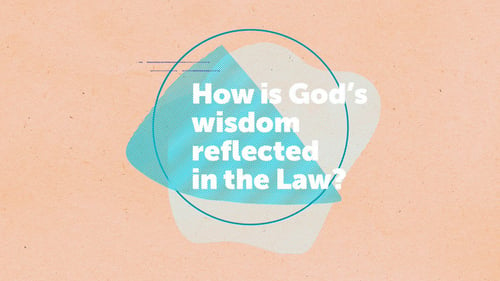
This week’s briefing jumps off from the message this past Sunday. If you missed it, you can watch the video or listen to the audio here.
I want to share more about the beauty of the Torah. This was a topic I had to cut due to time constraints, but which I think can help our church better appreciate the wisdom, justice, and beauty of the Torah.
In Sunday’s sermon, I gave three keys for understanding the Torah:
- It is not a law code.
- It is a narrative about a covenant relationship, which incorporates 611 selections of the covenant terms, to illustrate the nature of the relationship.
- Jesus fulfills the Torah.
Near the end of the message, I noted believers are not “bound” to the 611 laws there. Jesus fulfilled that covenant and has now instituted a New Covenant for Israel, which we Gentiles (non-Jews) have been grafted into (Romans 11). Now, for Jew and Gentile alike, our covenant is in Christ himself and we are bound to the Law of love (Romans 8) and we have peace with God (Romans 5).
This raises a question though.
If the Torah points toward Christ and has been fulfilled in Christ, then is the only purpose of the Torah to show our need for Christ? Now that we know that, can we skip reading it? "No, it also shows us the Wisdom of God".
The Torah stands as a source of Wisdom for all generations.
This is the perspective that opens up the Laws for followers of Jesus. When Jesus saw the law “Do not murder,” he sought the ideal underneath it. And it is that ideal, the Wisdom of God, that revolutionized justice for humanity.
In fact, I’m about to make a very bold statement:
The Torah is the source of “Equality,” “Justice for all,” and “Human Rights.”
For us in the United States, we’re familiar with the opening of the Declaration of Independence, “We hold these truths to be self-evident, that all men are created equal.” The irony is that was NOT self-evident for most of human history. In the ancient world, for a peasant to claim he was “created equal” to the king would have seemed ridiculous and laughable. Obviously not everyone is equal in intelligence, wisdom, strength, beauty, wealth, or length of life.
So where did this idea of people being “created equal” come from?
- The Bible is unique in picturing a marriage and covenant between God and his people. In that cultural context, marriages and covenants were only between royalty, not between royalty and the people. Not so with God. The Bible’s most revolutionary idea in the ancient world is that God desires a relationship of mutuality with people. In the ancient world, people were the slaves or servants of the gods, not covenant partners with them. In Israel, every person was seen as equal, and a covenant partner with YHWH (Yahweh, God's covenant name).
- The Torah dramatically strips down kings and priests in comparison to their Mesopotamian neighbors. This was an active overturning of Middle Eastern cultures, to bring down the kings and priests who elevated themselves in oppressing others. Priests were not allowed to own land (Deuteronomy 18:1-8). Kings were not allowed to acquire great wealth for themselves, or acquire many wives for themselves, and were required to keep the whole Torah (Deuteronomy 17: 14-20). When we read today that the priests were not allowed to own land, we might assume that was unjust or backwards, but given the context of the time, it was an application of justice to help reign in those with power (religious authorities & kings) so they wouldn’t oppress the people.
- The “governmental” system of the Torah is brilliant. It’s not a nation-state and it’s not a monarchy. The Torah paints a picture analogous to a farming co-op of equal partners. In Israel, every single person was seen as equal and a covenant partner with YHWH.
In summary, human rights, welfare, and social equality are all Biblical concepts that came into history via the revolution of ethical monotheism. We assume those concepts are eternal and abstract, when in fact they emerged from Israel’s Torah.
My hope in writing this is that when we read the Torah moving forward, let us read it like Jesus did. We know that all has been fulfilled in Christ, but we can still search for and appreciate the deep wisdom that undergirds the laws in context. Such an exploration may not always be easy, but thankfully we have a lifetime to learn, and Christ to carry us on the way.
For anyone who would like to explore these topics further, I recommend the following two books:
- (Semi-Popular level) “Justice for All: How the Jewish Bible Revolutionized Ethics” (2017) by Jeremiah Unterman
- (Scholarly level) “Created Equal: How the Bible Broke with Ancient Political Thought” (2011) by Joshua Berman



